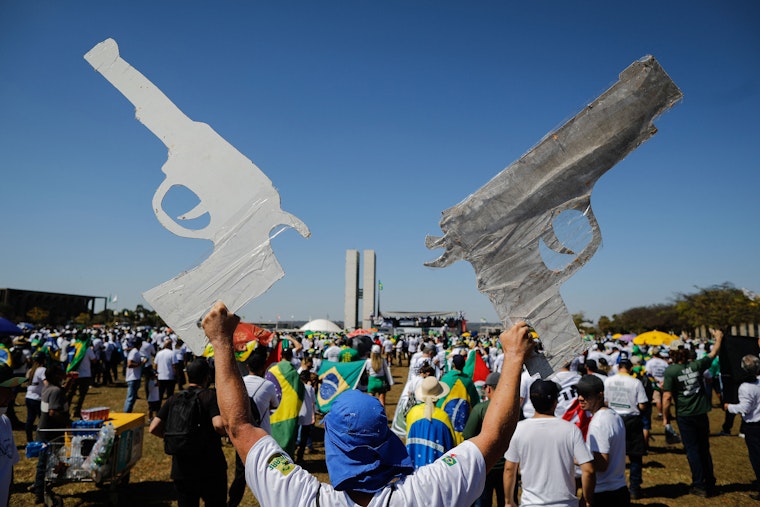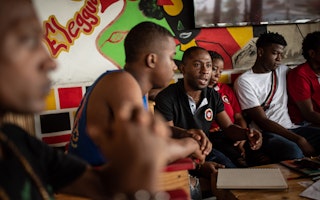Q&A: The Politicization of Brazil’s Police

Two decades ago, Brazil, then one of the world’s largest emerging democracies, saw gun violence skyrocket. That prompted a nationwide protest movement that ultimately turned into the nonprofit public safety research organization Sou da Paz, which stands for “I am Peaceful.” Today, Sou da Paz is a national think tank that raises awareness through street vigils and demonstrations, social media, lobbying government officials, and partnering with like-minded national groups to gather data on safety issues.
Since taking power in 2019, Jair Bolsonaro has enacted a series of executive orders aimed at increasing citizen access to guns with the argument that a well-armed society is a safer one. Sou da Paz found that gun sales spiked 23.6 percent in the first six months of 2021, making the total number of guns sold in that period higher than sales in the entire two years prior. Open Society spoke with Sou da Paz Coordinator Felippe Angeli about his concerns that these trends align with Bolsonaro’s attempts at defying the constitution and engaging the nation’s police forces in his crusade to stay in power.
Can you give us a brief history of how the politicization of police forces has evolved and how it is making a comeback?
Brazil has had a troubled democratic tradition. The country became a republic through a 1889 military coup that ousted Brazilian royalty installed by Portuguese colonists. We had coups in 1891, 1930, 1937, a failed one in 1955, and then one that led to a military dictatorship that lasted from 1964 until the late 1980s. Brazil elected a civilian president in 1985, but it wasn’t until 1988 that a new constitution was established to improve the rule of law. We’ve seen worrying signs of deterioration since 2013. That’s when a citywide protest in São Paulo over a hike in public transportation fares quickly morphed into nationwide demonstrations.
In 2011, President Dilma Rousseff signed a law creating a national truth commission to investigate human rights abuses, especially those committed during the military regime. On August 31, 2016, the Senate impeached her over controversial accusations of fraud in the public accounting system, and, as a result, she lost her presidency. While the military is not authorized to comment on politics, some high-ranking members offered public support for her impeachment.
Sou da Paz believes the country also has a sociopolitical tradition that could be called policialismo. In 1932, the state of São Paulo police led a defeated revolution to oust the authoritarian regime of then-President Getúlio Vargas, who came to power two years earlier in a coup. In the 1960s and 1970s, the state police became instruments of repression for the military regime. Today, what we’re seeing is the use of pop culture and social media to legitimize the political influence of police.
The number of elected police or military deputies jumped from four in the 2010 elections to 42 in the 2018 elections, representing an increase of 950 percent. And in 2020, we saw a 129 percent increase in the number of police and military members running for office for city government roles and a 106 percent increase in these members running for district roles, compared to the previous election.
How do you measure that pop culture and social media influence?
A study by Forum Brasileiro de Segurança Pública found that 27 percent of Brazilian police officers have engaged in antidemocratic content on social media, compared to just 17 percent of the overall Brazilian population. At the same time, research conducted for the human rights organization Intervozes’ Mídia Sem Violações de Direitos campaign shows that “true crime” programs, which often feature the most gruesome crimes, occupy prime-time slots on national television. The producers typically embed themselves with police. It’s also common for them to conduct on-camera interviews with underaged youth accused of a crime, which is illegal in Brazil. The shows are tremendously popular with the masses, who are understandably worried about crime.
Brazil had 50,033 homicides in 2020, which translates to 23.6 homicides per 100,000 people, and 76 percent of victims are Black.
The popular Netflix documentary Bandidos na TV shows an awful example of how some of that works. It centers on a corrupt joint venture between media and law enforcement in the Amazonas capital of Manaus. Intervozes has also found cases where suspects were framed for the shows, and officers who should be recording their operations for accountability often record sensational arrests and imprisonments, making the officers social media influencers and facilitating their entrance into political campaigning. Since the vast majority Brazil’s population has access to the internet and social media, everyone is making money off of advertising.
What parallels do you see with other countries in the region?
Former United States President Donald Trump is a great example. The real estate mogul and reality show TV star used his Twitter account to promote an image of himself as an aspiring caudillo. Upon taking office in 2017, he tried to curry favor with the military by beefing up defense spending and bringing many veteran military personnel into his administration. In his case, it didn’t go well because he ultimately fired them all. Then, at the end of his four-year term, he encouraged civilians unhappy with President Joe Biden’s win of the 2020 elections to storm the U.S. Capitol, which left several police officers dead and dozens severely injured as they tried to defend the nation’s most sacred democratic institution.
In addition to the clear similarities between Bolsonaro and Trump—fake news; the recall of the idea of a Western, Christian world; clearly pushing an agenda of national interests first; being against terrorism and globalization—they are very close to each other. One of their main protagonists is Trump’s political advisor Steve Bannon. His populist group, The Movement, has advised international leaders including Bolsonaro. This international ultra-rightwing activity contradicts their anti-interventionist stance on global affairs.
What makes you hopeful about Sou da Paz’s efforts?
I came of age in Brazil’s democracy, and I’ve never seen a threat to it as dismal as the one we’re seeing now, but I’m hopeful because Sou da Paz continues to build legitimacy. We have 29,000 followers on Instagram, 263,000 followers on Twitter, and 419,000 followers on Facebook who use those channels to get information, join online discussions, and become civically engaged with their communities and elected officials.
Instituto Sou da Paz is a grantee of the Open Society Foundations.


